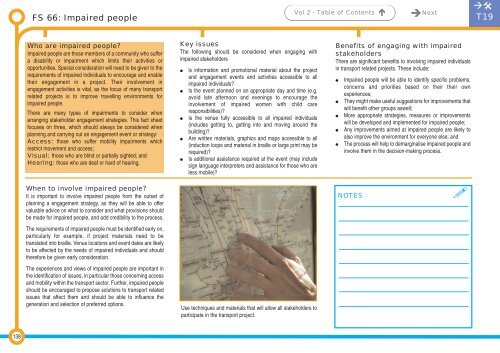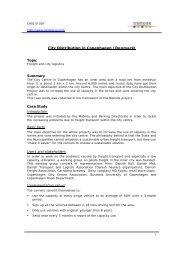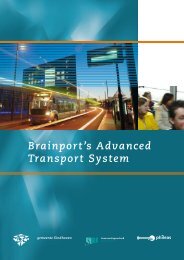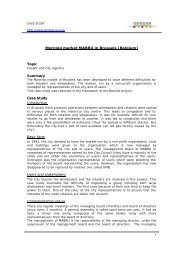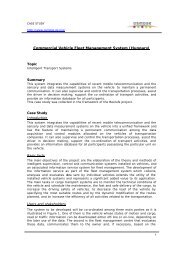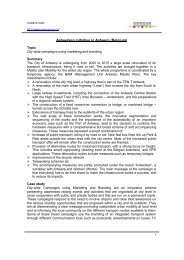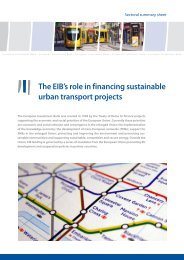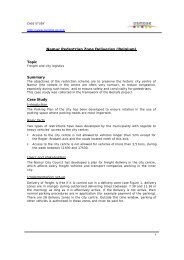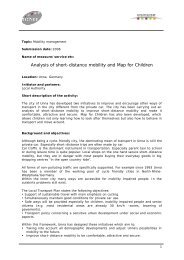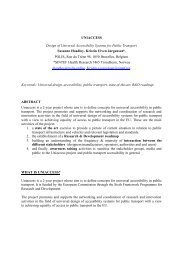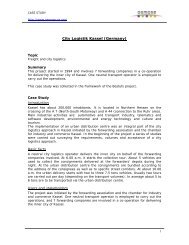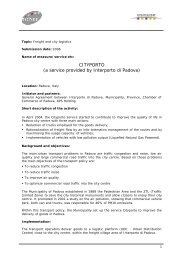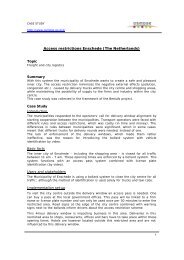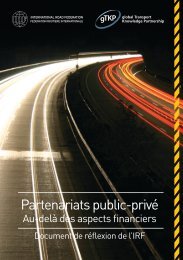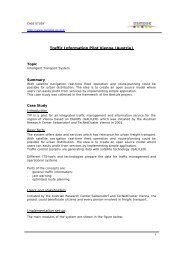Successful transport decision-making - Osmose
Successful transport decision-making - Osmose
Successful transport decision-making - Osmose
You also want an ePaper? Increase the reach of your titles
YUMPU automatically turns print PDFs into web optimized ePapers that Google loves.
FS 66: Impaired people<br />
Vol 2 - Table of Contents <br />
Next<br />
<br />
T19<br />
Who are impaired people?<br />
Impaired people are those members of a community who suffer<br />
a disability or impairment which limits their activities or<br />
opportunities. Special consideration will need to be given to the<br />
requirements of impaired individuals to encourage and enable<br />
their engagement in a project. Their involvement in<br />
engagement activities is vital, as the focus of many <strong>transport</strong><br />
related projects is to improve travelling environments for<br />
impaired people.<br />
There are many types of impairments to consider when<br />
arranging stakeholder engagement strategies. This fact sheet<br />
focuses on three, which should always be considered when<br />
planning and carrying out an engagement event or strategy:<br />
Access: those who suffer mobility impairments which<br />
restrict movement and access;<br />
Visual: those who are blind or partially sighted; and<br />
Hearing: those who are deaf or hard of hearing.<br />
Key issues<br />
The following should be considered when engaging with<br />
impaired stakeholders<br />
<br />
<br />
<br />
<br />
<br />
ls information and promotional material about the project<br />
and engagement events and activities accessible to all<br />
impaired individuals?<br />
Is the event planned on an appropriate day and time (e.g.<br />
avoid late afternoon and evenings to encourage the<br />
involvement of impaired women with child care<br />
responsibilities)?<br />
Is the venue fully accessible to all impaired individuals<br />
(includes getting to, getting into and moving around the<br />
building)?<br />
Are written materials, graphics and maps accessible to all<br />
(induction loops and material in braille or large print may be<br />
required)?<br />
Is additional assistance required at the event (may include<br />
sign language interpreters and assistance for those who are<br />
less mobile)?<br />
Benefits of engaging with impaired<br />
stakeholders<br />
There are significant benefits to involving impaired individuals<br />
in <strong>transport</strong> related projects. These include:<br />
<br />
<br />
<br />
<br />
<br />
Impaired people will be able to identify specific problems,<br />
concerns and priorities based on their their own<br />
experiences;<br />
They might make useful suggestions for improvements that<br />
will benefit other groups aswell;<br />
More appropriate strategies, measures or improvements<br />
will be developed and implemented for impaired people;<br />
Any improvements aimed at impaired people are likely to<br />
also improve the environment for everyone else; and<br />
The process will help to demarginalise impaired people and<br />
involve them in the <strong>decision</strong>-<strong>making</strong> process.<br />
When to involve impaired people?<br />
It is important to involve impaired people from the outset of<br />
planning a engagement strategy, as they will be able to offer<br />
valuable advice on what to consider and what provisions should<br />
be made for impaired people, and add credibility to the process.<br />
The requirements of impaired people must be identified early on,<br />
particularly for example, if project materials need to be<br />
translated into braille. Venue locations and event dates are likely<br />
to be affected by the needs of impaired individuals and should<br />
therefore be given early consideration.<br />
NOTES<br />
<br />
The experiences and views of impaired people are important in<br />
the identification of issues, in particular those concerning access<br />
and mobility within the <strong>transport</strong> sector. Further, impaired people<br />
should be encouraged to propose solutions to <strong>transport</strong> related<br />
issues that affect them and should be able to influence the<br />
generation and selection of preferred options.<br />
Use techniques and materials that will allow all stakeholders to<br />
participate in the <strong>transport</strong> project.<br />
138


